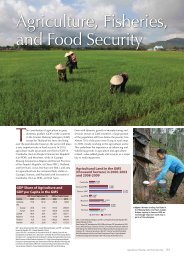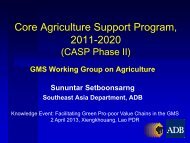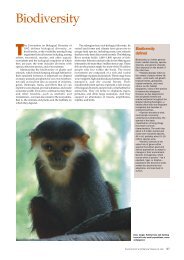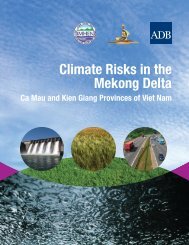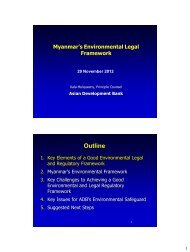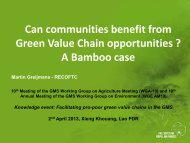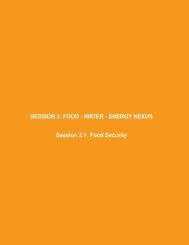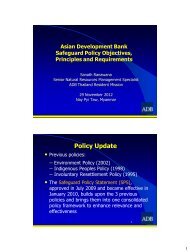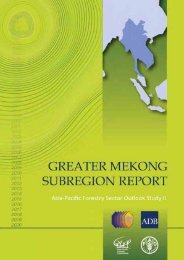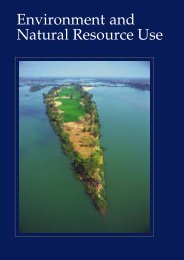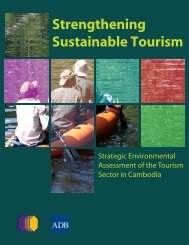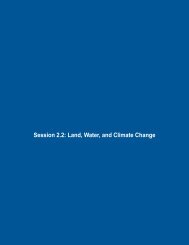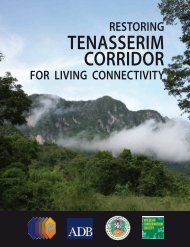Foreword and Conference Inauguration - GMS-EOC
Foreword and Conference Inauguration - GMS-EOC
Foreword and Conference Inauguration - GMS-EOC
You also want an ePaper? Increase the reach of your titles
YUMPU automatically turns print PDFs into web optimized ePapers that Google loves.
WelCOme RemaRks<br />
by<br />
Craig Steffensen,<br />
Country Director,<br />
ADB Thail<strong>and</strong> Resident Mission<br />
at the<br />
Gms 2020 International <strong>Conference</strong>: Balancing<br />
economic Growth with environmental sustainability<br />
20 February 2012<br />
Swasdee Khrap, Good Morning!<br />
I am Craig Steffensen, Country Director for the Asian<br />
Development Bank based here in Bangkok.<br />
And welcome to this 2-day gathering to discuss the Food-<br />
Water-Energy nexus.<br />
Nowhere was this nexus so clear as in Thail<strong>and</strong> recently.<br />
Exceptionally heavy rains in August <strong>and</strong> September 2011,<br />
accompanied by four tropical storms caused Thail<strong>and</strong>’s<br />
worst flooding since 1942.<br />
The death toll exceeded 700 persons <strong>and</strong> 4 million<br />
households or about 13 million people in 64 of<br />
Thail<strong>and</strong>’s 77 provinces were affected by flood waters,<br />
with widespread damage <strong>and</strong> loss to homes, factories,<br />
businesses, transport <strong>and</strong> energy infrastructure, social<br />
service facilities, <strong>and</strong> crops <strong>and</strong> livestock.<br />
The total economic damages <strong>and</strong> losses caused by the<br />
floods are estimated at about $45 billion, which, I think,<br />
makes it the fifth most costly national disaster on record.<br />
It is probably not an exaggeration to say that those who<br />
were affected by the floods, myself included, know first<br />
h<strong>and</strong> the interrelationship between food, water <strong>and</strong> energy.<br />
Bangkok, <strong>and</strong> most parts of Thail<strong>and</strong>, faced severe<br />
shortages of all three for months on end due to factory<br />
<strong>and</strong> business closures <strong>and</strong> supply chains being cut off by<br />
flood waters <strong>and</strong> energy outages. I think all of us remember<br />
the days when it was pretty hard to find a bottle of water<br />
or our favorite orange juice on supermarket shelves.<br />
Thail<strong>and</strong>’s agriculture took a big hit in 2011 because so<br />
much farml<strong>and</strong> was affected.<br />
So perhaps, the most important take away message from the<br />
2011 flood is the importance of inter-sectoral coordination<br />
to mitigate future disasters. Water management, in<br />
particular, requires a sound underst<strong>and</strong>ing of the big<br />
picture – requirements for hydropower, agriculture, industry<br />
<strong>and</strong> domestic consumption <strong>and</strong> the need to maintain the<br />
integrity of natural systems that buffer the extreme effects<br />
of fluctuating weather patterns are critical.<br />
The theme of this <strong>Conference</strong>: Balancing Economic<br />
Growth with Environmental Sustainability is very pertinent<br />
therefore to Thail<strong>and</strong> <strong>and</strong> to the Greater Mekong Subregion.<br />
With these words, Welcome!<br />
I would now like to call upon the Deputy Permanent<br />
Secretary of the Ministry on Natural Resources <strong>and</strong><br />
Environment, Khun Mingquan Wichayarangsaridh, to<br />
inaugurate the <strong>GMS</strong> 2020 <strong>Conference</strong>.<br />
Thank you very much.<br />
Welcome Remarks<br />
3



